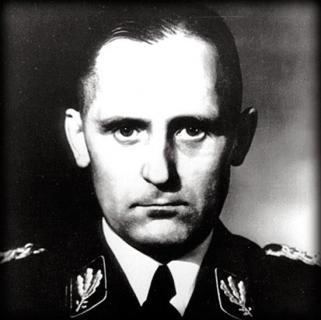 A perfect example of a typical Gestapo officer was its last chief Heinrich Müller whom Nazi lawyer and former police chief, SS-Obergruppenführer Werner Best called one of the “finest examples” of the Gestapo officers.
A perfect example of a typical Gestapo officer was its last chief Heinrich Müller whom Nazi lawyer and former police chief, SS-Obergruppenführer Werner Best called one of the “finest examples” of the Gestapo officers.
A decorated Great War veteran (at the age of eighteen he was awarded the Iron Cross 1st and 2nd class, Bavarian Military Merit Cross 2nd Class with Swords for outstanding bravery as the artillery spotting pilot – an almost suicide occupation at that time), during the years of the Weimar Republic Müller was head of the Munich Political Police Department.
On March 9th, 1933, during the Nazi putsch that deposed the Bavarian government of Minister-President Heinrich Held, he advocated to his superiors using force against the Nazis (who at that time already got substantial power in Germany after Hindenburg signed the Reichstag fire decree). Müller was openly critical of Adolf Hitler calling the latter “an immigrant unemployed house painter” and “an Austrian draft-dodger”.
Nazis in general (and Heydrich in particular) valued professionalism and loyalty to the government (whatever one it might be) much higher than political views and ideological preferences (and even the admiration of their Führer). Consequently, he immediately got a job in a recently established Gestapo.
Historian Richard J. Evans wrote about Müller:
“A true workaholic who never took a vacation, Müller was determined to serve the German state, irrespective of what political form it took, and believed that it was everyone’s duty, including his own, to obey its dictates without question. He served the Nazi regime out of professional ambition, not out of a belief in National Socialism”
On January 4th, 1937, an evaluation by the Nazi Party’s Deputy Gauleiter of Munich-Upper Bavaria delivered a devastating political evaluation of Müller. It stated:
“Police Chief Inspector Heinrich Müller is not a Party member. He has also never actively worked within the Party or in one of its ancillary organizations… He fought against left-wing movement very hard, sometimes in fact ignoring legal provisions and regulations … But it is equally clear that Müller would have acted against the Right [i.e. the Nazis] in exactly the same way…”
This assessment did not deter Heydrich (at that time chief of the Gestapo) from moving Müller up its management ladder. Functionaries like Müller were the sort of men Heydrich preferred since they were inherently committed to their “area of responsibility” and correspondingly justified any steps they deemed necessary against perceived enemies of the Nazi State.
British author and translator Edward Crankshaw described Müller as ”
“the arch-type non-political functionary who was obsessed with personal power and dedicated to the service of authority, the State”
Himmler biographer Peter Padfield wrote:
“Müller was an archetypal middle rank official: non-political, non-ideological, his only fanaticism lay in an inner drive to perfection in his profession and in his duty to the state – which in his mind were one … He was an able organizer, utterly ruthless, a man who lived for his work.”
Such was Müller dedication to his job that Auschwitz Commandant Rudolf Höss claimed that one could reach Müller “any time of the day or night, even Sundays and public holidays.”
Müller joined the SS in 1934 (interestingly enough, without joining NSDAP – an almost impossible feat in Nazi Germany). In 1936, Heydrich made Müller was the operations chief (essentially the second-in-command) of the Gestapo.
In September 1939, when the Gestapo and other police organizations were consolidated into the Reich Main Security Office (RSHA), Gestapo became RSHA Department IV. Heydrich was promoted to the chief of the whole RSHA and Müller became Director of the Gestapo. At that level in Nazi hierarchy he could no longer afford not to be the member of NSDAP so he very reluctantly joined the Nazi Party.
According to one legend when Berlin Gauleiter Josef Goebbels asked Müller during the obligatory membership interview if he, indeed, would prosecute the Nazis if the new government tells him to do so, he answered “Yes, of course”.
“At least you gave an honest answer” – said Goebbels. And approved Müller’s NSDAP membership application. Given the evaluation of Müller by the Bavarian NSDAP officials, this legend might very well be true.